De Duitse schrijfster, actrice en danseres Rahel Sanzara (eig. Johanna Bleschke) werd geboren op 9 februari 1894 in Jena. Zie ook alle tags voor Rahel Sanzara op dit blog.
Uit: Das verlorene Kind
“Christian B. lebte in der zweiten Hälfte des vorigen Jahrhunderts als Domänenpächter auf dem Gute Treuen bei L. im nördlichen Deutschland. Er war das jüngste Kind eines wohlhabenden Bauern, und seine Heimat war im Bezirke M. des gleichen Landkreises, einige Tagereisen von Treuen entfernt. Er hatte sie schon früh verlassen.
Bei seiner Geburt waren seine beiden Brüder bereits erwachsen gewesen und hatten mit dem Vater den elterlichen Hof beherrscht. Die Mutter starb früh, er hatte sie nie gekannt.
Sein Vater hatte beschlossen, daß der jüngste Sohn studieren, Geistlicher oder Lehrer werden sollte. So kam Christian als zehnjähriges Kind in die Kreisstadt und besuchte die Schule. Er war der fleißigste Schüler von allen, das Lernen fiel ihm leicht. Er war ein ernstes, ruhiges Kind, voll Güte und Bescheidenheit, und gewann alle Menschen zu Freunden. Es war ihm gegeben, daß sein Lachen rein, seine Handlungen gut und seine Tränen freudige sein konnten. Kein Leid, keine Bitterkeit, keine Enttäuschung, die das Leben selbst für ein Kind schon birgt, traf ihn. Sein Glück war keines andern Leid. Er hatte nie Verlangen nach der Heimat, seinen Fleiß stachelte kein quälender Ehrgeiz, sein Leben war ruhig, ohne Ziel. Er war fromm, im festen Glauben seiner Zeit erzogen, und betete in Demut, aber auch in einem unbedingten Vertrauen zu Gott.”
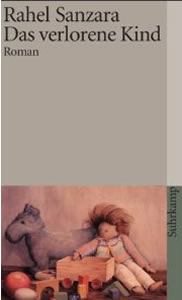
Rahel Sanzara (9 februari 1894 – 8 februari 1936)
Cover
De Britse advocaat en schrijver Sir Anthony Hope Hawkins werd geboren op 9 februari 1863 in Londen. Zie ook alle tags voor Anthony Hope op dit blog.
Uit: The prisoner of Zenda
“Well then—and I must premise that I am going, perforce, to rake up the very scandal which my dear Lady Burlesdon wishes forgotten—in the year 1733, George II. sitting then on the throne, peace reigning for the moment, and the King and the Prince of Wales being not yet at loggerheads, there came on a visit to the English Court a certain prince, who was afterwards known to history as Rudolf the Third of Ruritania. The prince was a tall, handsome young fellow, marked (maybe marred, it is not for me to say) by a somewhat unusually long, sharp and straight nose, and a mass of dark-red hair—in fact, the nose and the hair which have stamped the Elphbergs time out of mind. He stayed some months in England, where he was most courteously received; yet, in the end, he left rather under a cloud. For he fought a duel (it was considered highly well bred of him to waive all question of his rank) with a nobleman, well known in the society of the day, not only for his own merits, but as the husband of a very beautiful wife. In that duel Prince Rudolf received a severe wound, and, recovering therefrom, was adroitly smuggled off by the Ruritanian ambassador, who had found him a pretty handful.
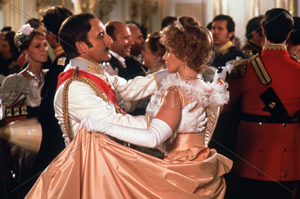
Scene uit de film van Richard Quine met Peter Sellers en Britt Ekland, 1979
The nobleman was not wounded in the duel; but the morning being raw and damp on the occasion of the meeting, he contracted a severe chill, and, failing to throw it off, he died some six months after the departure of Prince Rudolf, without having found leisure to adjust his relations with his wife—who, after another two months, bore an heir to the title and estates of the family of Burlesdon. This lady was the Countess Amelia, whose picture my sister-in-law wished to remove from the drawing-room in Park Lane; and her husband was James, fifth Earl of Burlesdon and twenty-second Baron Rassendyll, both in the peerage of England, and a Knight of the Garter. As for Rudolf, he went back to Ruritania, married a wife, and ascended the throne, whereon his progeny in the direct line have sat from then till this very hour—with one short interval. And, finally, if you walk through the picture galleries at Burlesdon, among the fifty portraits or so of the last century and a half, you will find five or six, including that of the sixth earl, distinguished by long, sharp, straight noses and a quantity of dark-red hair; these five or six have also blue eyes, whereas among the Rassendylls dark eyes are the commoner.”
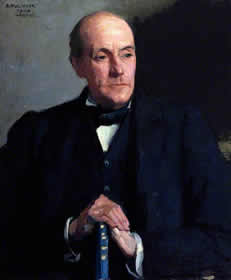
Anthony Hope (9 februari 1863 – 8 juli 1933)
Portret door Alfred Aaron Wolmark, 1908
De Russische dichter en vertaler Vasily Andreyevich Zhukovsky werd geboren op 9 februari (29 januari) 1783 inMishenskoe bij Tula. Zie ook alle tags voor Vasily Zhukovsky op dit blog.
To A Familiar Genius Flying By
Reveal yourself, anonymous enchanter!
What heaven hastens you to me?
Why draw me to that promised land again
That I gave up so long ago?
Was it not you who in my youth
Enchanted me with such sweet dreams,
Did you not whisper, long ago,
Dear hopes of a guests ethereal?
Was it not you through whom all lived
In golden days, in happy lands
Of fragrant meadows, waters bright,
Where days were merry ?neath clear skies?
Was it not you who breathed into my vernal breast
Some melancholy mysteries
Tormenting it with keen desire
Exciting it to anxious joy?
Was it not you who bore my soul aloft
Upon the inspiration of your sacred verse,
Who flamed before me like a holy vision,
Initiating me into life’s beauty?
In hours lost, hours of secret grief,
Did you not always murmur to my heart,
With happy comfort soothe it
And nurture it with quiet hope?
Did not my soul forever heed you
In all the purest moments of my life
When’ere it glimpsed fate’s sacred essence
With only God to witness it?
What news bring you, O, my enchantress?
Or will you once more call in dreams
Awaken futile thoughts of old,
Whisper of joy and then fall silent?
O spirit, bide with me awhile;
O, faithful friend, haste not away;
Stay, please become my earthly life,
O, Guardian angel of my soul.
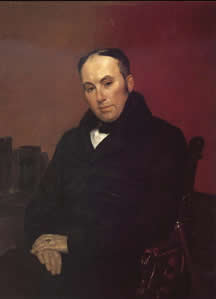
Vasily Zhukovsky (9 februari 1783 – 12 april 1852)
Portret door Karl Briullov, 1837
De Duitse dichteres en schrijfster Karoline Louise Brachmann werd geboren op 9 februari 1777 in Rochlitz. Zie ook alle tags voor Karoline Brachmann op dit blog.
Sympathie
Seelig, wenn aus des Geliebten Blicken
Die verwandte Seele wiederstrahlt!
Wenn sich unser Kummer und Entzücken
Spiegelnd in des Freundes Auge malt;
O wie süß! wenn uns des Herzens Regung
Im geliebten Auge flammenhell
Aufblitzt, sympathetisch die Bewegung
Durch die Pulse flieget heiß und schnell!
Wie in einem Meer voll süßer Wonne
Untergeht im theuren Aug’ der Blick,
Und es glänzt ihm eine schöne Sonne
Von der lichten Spiegelfluth zurück.
Wunderbar doch schlang die ew’ge Liebe
Jenes Band, das unser Loos versüßt,
Das mit mächt’gen, unaufhaltbar’n Triebe
Unsre Herzen aneinander schließt!
Jeder strebt, das eigne Glück zu finden,
Jeder sucht den Urquell eigner Lust;
Und wo fließt er? In den heil’gen Gründen,
In den Tiefen der geliebten Brust!
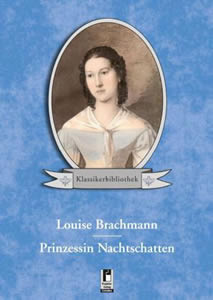
Karoline Brachmann (9 februari 1777 – 17 september 1822)
Cover
